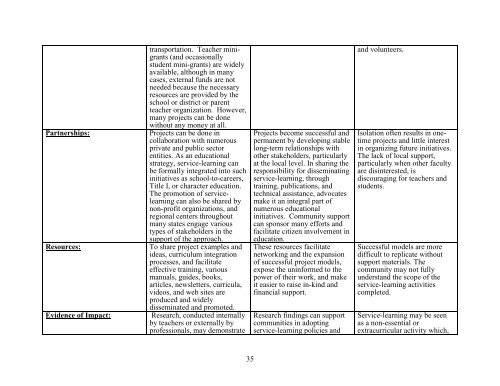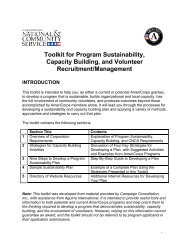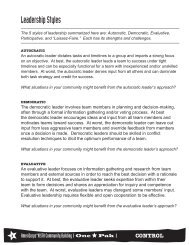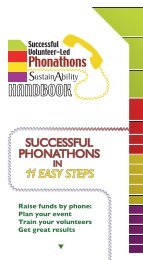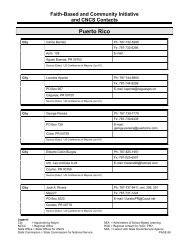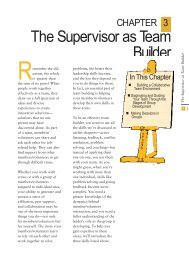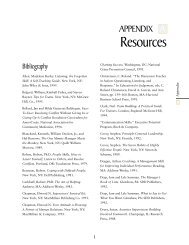MAKE IT LAST FOREVER: THE ... - National Service Resource Center
MAKE IT LAST FOREVER: THE ... - National Service Resource Center
MAKE IT LAST FOREVER: THE ... - National Service Resource Center
You also want an ePaper? Increase the reach of your titles
YUMPU automatically turns print PDFs into web optimized ePapers that Google loves.
transportation. Teacher minigrants<br />
(and occasionally<br />
student mini-grants) are widely<br />
available, although in many<br />
cases, external funds are not<br />
needed because the necessary<br />
resources are provided by the<br />
school or district or parent<br />
teacher organization. However,<br />
many projects can be done<br />
without any money at all.<br />
Partnerships: Projects can be done in<br />
collaboration with numerous<br />
private and public sector<br />
entities. As an educational<br />
strategy, service-learning can<br />
be formally integrated into such<br />
initiatives as school-to-careers,<br />
Title I, or character education.<br />
The promotion of servicelearning<br />
can also be shared by<br />
non-profit organizations, and<br />
regional centers throughout<br />
many states engage various<br />
types of stakeholders in the<br />
support of the approach.<br />
<strong>Resource</strong>s: To share project examples and<br />
ideas, curriculum integration<br />
processes, and facilitate<br />
effective training, various<br />
manuals, guides, books,<br />
articles, newsletters, curricula,<br />
videos, and web sites are<br />
produced and widely<br />
disseminated and promoted.<br />
Evidence of Impact: Research, conducted internally<br />
by teachers or externally by<br />
professionals, may demonstrate<br />
35<br />
Projects become successful and<br />
permanent by developing stable<br />
long-term relationships with<br />
other stakeholders, particularly<br />
at the local level. In sharing the<br />
responsibility for disseminating<br />
service-learning, through<br />
training, publications, and<br />
technical assistance, advocates<br />
make it an integral part of<br />
numerous educational<br />
initiatives. Community support<br />
can sponsor many efforts and<br />
facilitate citizen involvement in<br />
education.<br />
These resources facilitate<br />
networking and the expansion<br />
of successful project models,<br />
expose the uninformed to the<br />
power of their work, and make<br />
it easier to raise in-kind and<br />
financial support.<br />
Research findings can support<br />
communities in adopting<br />
service-learning policies and<br />
and volunteers.<br />
Isolation often results in onetime<br />
projects and little interest<br />
in organizing future initiatives.<br />
The lack of local support,<br />
particularly when other faculty<br />
are disinterested, is<br />
discouraging for teachers and<br />
students.<br />
Successful models are more<br />
difficult to replicate without<br />
support materials. The<br />
community may not fully<br />
understand the scope of the<br />
service-learning activities<br />
completed.<br />
<strong>Service</strong>-learning may be seen<br />
as a non-essential or<br />
extracurricular activity which,


